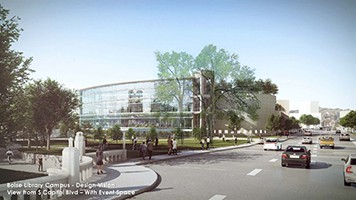


Yesterday, Idaho legislators introduced House Bill 217, that would require a public vote before urban renewal dollars could be spent on public projects, such as a library or stadium. The significance of this bill expands all across Idaho, for any city with an urban renewal agency, but it has particular promise for the proposed library and stadium projects in Boise.
Boise is in the middle of public opposition to two big-budget projects, with concerned residents asking for a vote. If this bill passes, it would provide Boiseans with just that—a public vote. But, it may only provide residents of Boise with a vote on one of the two projects. As written, it is likely HB 217 would require a public vote on the stadium, but it may not lead to a vote on the library.
HB 217 would change state laws that govern urban renewal agencies (URAs). URAs are separate taxing entities, distinct from a city, that collect taxes from certain districts within a city’s boundaries instead of the city in its entirety. Currently, urban renewal money can be used to help fund a public project without a vote, if the money used is less than 51 percent of the project’s total value. This bill would change this requirement to a binding public vote on any contribution of urban renewal money to a public project—even a $1 contribution would require a public vote and 55 percent voter approval.
This is great news for Idahoans. Cities have increasingly used urban renewal as a way to support public projects without having to ask for voter approval.
However, this bill includes certain uses of urban renewal dollars that are exceptions, and would not require a public vote. The bill states that public votes:
[S]hall not apply to infrastructure or below ground improvements necessary or ancillary to a municipal building constructed or remodeled pursuant to this subsection including, but not limited to, water, sewer, storm drainage, electrical, natural gas, telecommunication, or other similar systems and lines, streets, roads, curbs, gutters, sidewalks, walkways, parking, or unoccupied auxiliary structures.
The exception granted for parking really undermines a potential vote on the new main library project in Boise.
Currently, the estimate for the library project is that it will receive funding from four sources: $15 million from CCDC, $15 million from the city, $18 million from donations, and $32 to $37 million from lease financing. HB 217 only addresses the $15 million that will come from the Capital City Development Corporation (CCDC)—also known as urban renewal money. So this bill only addresses about 18 percent of the library project budget, which could be enough to kill the project if residents voted it down—except residents might not get a vote.
CCDC and other officials in the city have been adamant that the $15 million contribution of urban renewal money will go towards a parking garage—an exception listed in HB 217. Thus, if upheld, no public vote would be legally required. And the project’s remaining $70 million is supposedly coming from the other funding sources cited above, which fall outside the scope of this legislation.
If CCDC is only contributing money for parking, which is exempt from a vote, and the rest of the library budget is not coming from urban renewal, then a vote on the library would not be required per this legislation.
However, there may still be hope for a vote on the library because a significant financial question remains for the project: Who is paying for the $32 to $37 million in lease financing?
Lease financing is a way for a government entity to use long-term payments to repay a debt. Lease financing is a system that would give ownership of the library to the lender that gave money to the project, until the responsible entity has paid all the money back ($32 to $37 million). It has yet to be established who that responsible entity will be—the city or another taxing district, such as CCDC.
If the urban renewal agency will provide the lease financing, then a vote would be required under HB 217—and Boiseans would get their voter input.
No matter the scenario for the library, if this bill becomes law, there will be a public vote to approve or reject urban renewal dollars used for a stadium. So, at the very least, the passage of this bill would require a vote for one of the two big-budget projects in Boise. And, under certain circumstances, both projects could see a vote.


